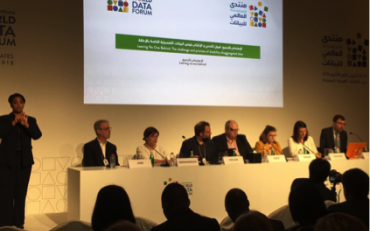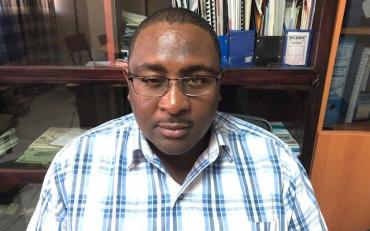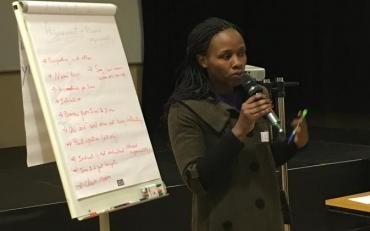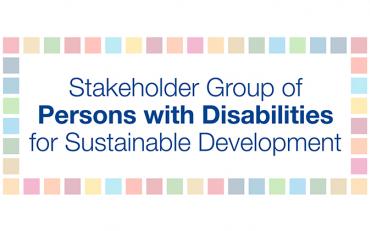<< Back to Disability Data Advocacy Working Group page
WELCOME!
Welcome to the first disability data newsletter! We wish to extend a particular thanks to those who have contributed to this newsletter. It is our hope that these newsletters will provide new and relevant information on disability data and serve as a practical resource. We welcome and encourage all of you to contribute to the future newsletters by emailing us at HLPF2019 [at] ida-secretarat.org. Additionally, please connect to our disability data listserv by following the instructions here.
Contents
1. Information on disability data webinar series
2. Learn more about gathering and analyzing disability data
3. Blogs
- Blog #1: “Data: Is it the new Oil, Water or light for Sustainable Development?”
- Blog #2: “Information System of Persons with Disabilities in Guatemala”
- Blog #3: “Kenya Census 2019: Ensuring that all persons with disabilities are counted”
- Blog #4: “People with Intellectual Disabilities: Moving from Invisibility to Inclusion”
4. Updates and other news
5. Resources
6. Marketplace
1. Information on Disability Data Webinar Series
The Stakeholder Group of Persons with Disabilities held the first webinar of its series on 31 January on collecting data on persons with disabilities in humanitarian action. If you were unable to join us, a recording of the webinar can be found here. Additional resources can be found below.
Webinar presentations can be found below:
- Intro presentation and presentation 3 - HI
- Presentation 1 - Disability data collection in BDRCS
- Presentation 2 - HI & iMMAP Jordan
To learn more about the Washington Group, click here.
- Fact-sheet on collecting data in humanitarian action using the Washington Group questions
- Summary of findings of Humanity & Inclusion’s action-research (published with Leonard Cheshire)
- HI/IMMAP Report presented by Yahoko Asai
- Humanity & Inclusion’s website which contains all links for the learning toolkit and updates from the project
- Article on the launch of the learning toolkit
WEBINAR #2: 27 February from 10:00 AM - 11:00 AM EST (New York time) to provide technical guidance on gathering and analyzing disability data. To register for this webinar, please click here.
2. Learn More About Gathering and Analyzing Disability Data
Do you want to learn more ahead of time about the topic of the next disability data webinar on 27 February? If yes, please read the small excerpt below taken from an article written by the Washington Group!
Disability Measurement and Monitoring using the Washington Group Disability Questions
What data are needed to monitor adherence to the UN Convention on the Rights of Persons with Disability (UNCRPD) and the 2030 Sustainable Development Goals (SDGs)?
Inclusion is the guiding principle of the UNCRPD and the 2030 Agenda for Sustainable Development. The routine collection of development indicators by disability status is required so that outcomes of people with and without disabilities can be compared. Including a succinct set of disability questions on existing data collection instruments allows for disaggregation by disability status for SDG indicators, and for other measures of participation, without the need for additional (and costly) surveys. To read the full article, please click here.
3. Blogs
Blog #1: “Data: Is it the new Oil, Water or light for Sustainable Development?”
The blog is written on Thursday, October 25, 2018, by Lars Bosselmann, CBM International.
 Don’t worry, this short blog is not going to explore the meaning of the various images used in the title, but they were referenced during the 2nd UN World Data forum again and again, so I thought they might serve as a nice way to introduce this blog. All of them suggest that without data, progress in implementing the 2030 Agenda for Sustainable Development cannot be made or measured.
Don’t worry, this short blog is not going to explore the meaning of the various images used in the title, but they were referenced during the 2nd UN World Data forum again and again, so I thought they might serve as a nice way to introduce this blog. All of them suggest that without data, progress in implementing the 2030 Agenda for Sustainable Development cannot be made or measured.
The UN World Data Forum 2018 was hosted by the Federal Competitiveness and Statistics Authority, of United Arab Emirates from 22 to 24 October 2018, with support from the Statistics Division of the UN Department of Economic and Social Affairs, under the guidance of the United Nations Statistical Commission and the High-level Group for Partnership, Coordination and Capacity-Building for Statistics for the 2030 Agenda for Sustainable Development.
The long list of hosts and supporting partners listed here above, will already give you an idea of how diverse and broad the participants were. All came together, for the second Data Forum of this kind, to present and debate the need to collect, interpret and use the right data, in order to support and inform the right decisions to advance the implementation of the 2030 Agenda. The Forum, which was attended by over 2000 people, was held in plenary and many concurrent sessions focussing on specific topics. The programme was extremely diverse, ranging from sessions about the role of national statistical offices to the debate on whether there is a lack of public trust in data in times of social media.
In the midst of this vast programme, there was the motto of the 2030 Agenda to leave no one behind that was quoted as one of the key principles of the Agenda in almost all sessions! And there was broad consensus that we still have too little data about people who are left behind and about the causes for people being left behind. In that regard, data was often seen as a tool to empower people, rather than just being numbers! A clear sense of urgency came from the Data Forum to speed-up collection of data about those who are, or who are supposedly, amongst the most marginalised groups of the population. While there was agreement amongst participants that method’s to collect data are changing and will include in the future more innovative ways (such as data collected via mobile phones), the role and recognition of citizens gathered data to inform the “official” data picture remains a matter for further discussion.
It was very positive to see that persons with disabilities were mentioned during the Data Forum in the context of leaving no one behind. This is certainly not a given in such “expert fora” and would not have been the case few years ago! At the same time, that visibility of disability data was largely made possible by the interventions of DPO representatives from within the International Disability Alliance (IDA) and its members as well as disability-focussed NGOs such as CBM. This shows that we still have a long way to go, in order to convince statisticians and the “Data Community” to really include ALL in their thinking and in their work! But the Data Forum in Dubai undoubtedly provided a positive further step in that direction!
Blog #2: “Information System of Persons with Disabilities in Guatemala”
 The blog is written by: Ramiro Nochez-McNutt, Ministry of Social Development in Guatemala, rnochezmc [at] gmail.com
The blog is written by: Ramiro Nochez-McNutt, Ministry of Social Development in Guatemala, rnochezmc [at] gmail.com
In March of 2014, president of Ecuador, Rafael Correa came to Guatemala to participate in the Esquipulas 2014 regional forum. Among the many issues that were addressed, the presidential agenda included a very specific request on the issue of disability, due to the influence of his Vice President (now President) Lenin Moreno, who is a person with a disability.
My boss, the Vice Minister of Policy, Planning and Evaluation of the Ministry of Social Development, gave me instructions to propose a project for persons with disabilities (PWD). I requested information about persons with disabilities in Guatemala to different sources and actors, but the only information available came from a disability survey conducted in 2005, which was neither very reliable nor up-to-date. We searched further but there were none, so I proposed to develop a registry of persons with disabilities. We contacted CONADI, who is the official governing body for disability in Guatemala, shared our findings and began to organize the project.
The project lacked everything, from budget to clarity of the goals and objectives that were intended to achieve, however, some important advances were reached within the first round of discussions and negotiations. A prototype was developed, and some information was collected but with the frequent change of authorities, the project was losing interest and minimized. The political ambiance and environment are complicated in Guatemala and have affected the development and implementation of the project, as with every new administration taking power, the project would stall and had to restart again. Due to this lethargy and lack of response, I decided to assume personal responsibility of developing the project outside the institutional framework and started to develop a new prototype but do keep the institutional contact to ensure implementation and operation of the project with the responsible actors.
Prior to working for the Ministry of Social Development in Guatemala, I worked for the International Organization for Migration (www.iom.int) for almost 20 years; where I was deployed to many countries in the world and participated in the design and implementation of information systems for vulnerable populations (refugees, returnees, displaced persons in Kosovo, Colombia, Guatemala and other countries). One of the most notable results of that experience was the repatriation of 45,000 refugees from Mexico to Guatemala. We developed a registration system that started data collection in the refugee camps in Mexico and we gathered all the socioeconomic information from the family nucleus and after consolidation and statistical validation, we produced a characterization of the vulnerable group to try to obtain ahead of their physical movement to Guatemala, the services (schools, health posts, productive projects, identification of individuals with high vulnerability, etc.) that they would require upon arrival at their final destination. From that experience, I understood the strategic value that a registration system can mean & represent, because it allows us to determine and precisely locate the needs that these population groups require, so our proposal for identifying and attending the needs of persons with disability (+98% under poverty or extreme poverty line situation) is to create and implement a registry of persons with disabilities.
In my experience as a public servant, I have been able to observe the lack of coordination and articulation that exists within the State as well as a high turnover of officials that result in loss of experience and institutional knowledge to meet social demands. For this reason, we are proposing a model that clearly and unequivocally identifies the person with disability, accurately determining the community's service environment, the socioeconomic situation of the family nucleus and the type and degree of physical or intellectual dysfunction so that the project can function besides an information & statistical system, also as a referential system matching persons with disabilities needs (social demand) with programs and interventions provided by the State and NGOs or IOs (social offer). Once a person is accepted as a candidate or user of a program or social intervention, the system will be able to follow up monitoring the compliance of the service and to provide political incidence when required. Additionally, a baseline will be established that will be evaluated on a regular basis to determine effectiveness and compliance of commitments and co-responsibilities of both, the State/NGOs and the person with disability.
Methodology
A web tool is being developed, which allows the collection of information. This then correlates with the interventions or programs available from the State and other service providers (NGOs) and refers both electronically and in hard copy the user to the institution or service provider. In addition to characterizing the registered population, a package of demands can be established for the consolidated group which it can be presented to different actors to negotiate areas of intervention or assistance not covered or considered by the providers.
Data is recorded in real time via tablets, through web questionnaires by interviewers who visit house unit by house unit according to a predefined cartography plan, inquiring about the existence of a person with a disability in the household. When a person with a disability is found, the interviewer presents the project goals and methodology, and then asks if he/she would be interested in providing and sharing their personal information, if the answer is no (negative), the interviewer provides a brochure with useful information about the project and about disability in Guatemala. If the answer of the person with disability is yes (affirmative), the interviewer proceeds with the interview and collects all data, including GPS of the household for later processing on a GIS system. At the end of the interview, provides an information kit, contact numbers, project URL that can be both, accessed via a computer or smartphone and indicate that his/her data will be part of that database of potential users for disability programs or projects but also of the disability statistics of that municipality.
Back office, information is analyzed, matched and referred to possible solution providers where the record is forwarded electronically and physically (hardcopy) to request assistance, the record is flagged and the actions monitor started, to follow-up on the results.
To date, the US Department of State has granted a seed fund that will be used to conduct a pilot test in a small location (municipality of Teculutan) in which the proposed methodology and instruments will be evaluated. The project will be carried out with contributions from the State of Guatemala in specific aspects to link actions and facilitate their implementation.
The web portal also provides information on the compliance of the State of Guatemala with the Convention on the Rights of Persons with Disabilities and participating institutions, as well as guidance on legal instruments and other useful information for persons with disabilities.
Expected results
- Socioeconomic characterization of the target group of study.
- Obtain firsthand information about the real demands of persons with disabilities and correlate them to the public offer
- identify extreme vulnerable cases that need an urgent response.
- Develop a referential system and test response from Gov/NGOs.
- Develop a very functional prototype information system that can be expanded to further regions and replicate the experience.
Blog #3: “Kenya Census 2019: Ensuring that all persons with disabilities are counted”


Anderson Gitonga – Chief Executive Officer - United Disabled Persons of Kenya (left) and Elizabeth Ombati - Users and Survivors of Psychiatry in Kenya/ Fellow-Bridge CRPD (right)
The Kenya Population and Housing Census will be carried out on the night of 24th/25th August 2019. The Washington Group Short set of questions will be used to identify the number of persons with disabilities in the country and this is exciting for the disability movement. This is because since the last census, 10 years ago, the number of persons with disabilities which is said to be 3.5% of the population (1,330,366) is seen to be an undercounting.
The Washington Group short set of questions has been recommended by UN agencies, organizations of persons with disabilities, civil society and independent experts to ensure international comparability over time for the purposes of implementation of the Sustainable Development Goals and inclusive development.
Therefore, to use the WG short set of questions is something that the disability movement in Kenya has advocated for with the hope that it will ensure the availability of quality data that can inform interventions. It has taken diverse interventions for this to happen.
Firstly, two statistical officers from the Kenya National Bureau of Statistics (KNBS) which is the principal government agency that gives official statistics, have over time been intensely trained on the importance of using the WG questions to collect disability data. These officers are in charge of building the capacity of their colleagues at KNBS and other stakeholders on disability data disaggregation.
Secondly, persons with disabilities, through the United Disabled Persons of Kenya have undergone trainings on disability data including the use of the WG module. The International Disability Alliance through its Bridge CRPD SDGs training continues to strengthen the capacities of leaders in the disability sector on advocacy for appropriate disability data.
As such, UDPK has been a member of the Census Technical Working Group that has played the advisory role of planning and coordinating the coming 2019 census. Through engagement and consultation, it was possible for the various stakeholders represented to agree on including WG module in the data collection main data collection tool. In addition to the 6 questions, there is an additional question on collecting data on persons with albinism.
In one meeting where UDPK had called for a meeting of government officers and DPOs to discuss how to ensure we have good disability data in Kenya, a participant noted that in Kenya it was easy to know the number of elephants in the wild but not the number of persons with disabilities in the country! It sounded amusing but in a way, it was to let the government know that it would be hard to plan for inclusion for persons with disabilities if they hardly had accurate data on them.
The good news is that already as a country, a pilot census has been carried out and the WG set of questions was incorporated and used. KNBS officers note that there were key learnings as this is the first time the country is using the module in data collection. There had been fears raised by the Census Technical Working Committee that too many questions in the census tool may lead to an overload and it was critical that the officers who had undergone the training on WG were able to show the team the importance of making sure that good data on disability is captured. This is actually important for everyone because we can’t know if we have attained all sustainable development goals for all if we miss data on groups that are more likely to be marginalized.
KNBS, however, feel that before the census, there is a need to strengthen more the capacities of the entire Census Technical Working Committee on the use of the WG questions. These are the principle trainers and through them, the training is cascaded. They are the ones who train content supervisors who in turn train the enumerators. Therefore, if not properly understood at the top level, we may not get desired results. As UDPK we shall continuously engage with KNBS and persons with disabilities across the country to ensure that we get the best results from this process.
In the recent past, for instance, the Kenya Integrated Household Budget Survey was conducted but could not give much information on disability statistics because it failed to use the WG framework. Going forward, we hope that the WG questions can be used in all surveys and in the various government's departments that collect administrative data. There is a need to do targeted advocacy to sensitize all institutions collecting information to ensure that statistics are disaggregated in terms of disability among other parameters.
The census gives us hope that this can actually happen in future. This is important more so now that KNBS has embarked on ensuring that they have a critical mass of individuals with knowledge and skills on disability data.
Additionally, the continued collaboration between UDPK and KBNBS will is valuable in outreach and awareness creation during the census period. Persons with disabilities, apart from also working as enumerators, will be involved in capacity building and also supporting KNBS in coming up with messaging so as to ensure it is in an accessible form and reaches persons with disabilities across the country. KNBS is also looking at having people trained in Sign Language Interpretation in every county.
As a movement, we know that in implementing the Convention on the Rights of Persons with Disabilities, data is very critical for States to implement policies to ensure the inclusion of persons with disabilities. And now that there is a call to significantly increase the availability of high quality, inclusive, timely and reliable data disaggregated by among other indicators disability, we hope that this, for us, will be among the many steps that have been made in the country to achieve our inclusion.
Blog #4: “People with Intellectual Disabilities: Moving from Invisibility to Inclusion”

The blog is written by: Anjela Jenkins, J.D. - Manager, Partnerships for Inclusive Health - ajenkins [at] specialolympics.org
The dearth of comprehensive, standardized data is an issue that spans the globe, afflicts all kinds of disability, and plagues efforts for field-leveling policy-making at every level. At Special Olympics, our focus is on people with intellectual disabilities (ID); however, intellectual disabilities are often not differentiated in the data from mental disabilities or from difficulties in the areas of learning and memory that result from conditions such as dementia or traumatic brain injury. Furthermore, where they exist, the data point to a reality in which many people with ID also live with another type of disability. Nevertheless, it is likely that the ongoing stigma of ID continues to lead to its underreporting, as it can be a less noticeable disability and, indeed, 85% of people with ID have only mild impairment.
The result is a vicious cycle of invisibility and exclusion.
Special Olympics breaks this cycle by providing year-round sports training and athletic competition in a variety of Olympic-type sports for children and adults with ID, giving them continuing opportunities to develop physical fitness, demonstrate courage, experience joy and participate in a sharing of gifts, skills and friendship with their families, other Special Olympics athletes, and the community.
But that’s not all. We are also driving an inclusion revolution by generating data and research on people with intellectual disabilities.
International attitudes research conducted by Special Olympics demonstrates that attitudes towards people with ID have changed dramatically in the past 15 years. In our 2003 study in 10 countries, 60-90% of respondents thought people with ID should be educated at home or go to special schools, and around half of respondents thought people with ID should work in special workshops or not at all. Meanwhile, the preliminary results of our late 2017/early 2018 survey of over 35,000 people from 15 countries and 6 US cities show that around 70% of respondents view people with ID as hardworking, employable, or peers. Then, the global perception was that people with ID could engage in simple activities such as sustaining friendships and completing basic daily self-care activities, but less capable of more complex demands such as navigating emergencies; now, respondents indicated high levels of agreement for the rights of people with ID, but there is less agreement that people with ID are capable of exercising those rights.
We know that increased exposure to people with ID leads to more inclusion. In 2017, the Pan American Sanitary Conference of the Pan American Health Organization, Regional Office for the Americas of the World Health Organization (PAHO/WHO), cited Special Olympics data demonstrating the unmet health needs of people with ID. The disparities are actually somewhat unsurprising considering that in one survey, 81% of medical students and 50% of dental students interviewed indicated they had received no clinical training on care of patients with disabilities! The inclusion revolution is that around 90% of healthcare professionals who volunteered with Special Olympics found the experience useful, with over 70% wanting to seek out more patients with ID as a result. Similarly, 79% of people without ID who played football (soccer) alongside Special Olympics athletes with ID reported an improved understanding of people with ID.
With a global footprint and over 50 years of experience, Special Olympics looks forward to seeing—and contributing—to data that help people with intellectual and other disabilities move from invisibility to inclusion. Please, click here to see a detailed infographic.
INPUT OPPORTUNITY! We welcome and encourage those who wish to contribute relevant blogs to future newsletters to do so by emailing HLPF2019 [at] ida-secretariat.org.
4. Updates and Other News
Stakeholder Group of Persons with Disabilities submits key policy priority areas to the UN Statistics Division.
The Stakeholder Group of Persons with Disabilities (SGPwD) shared the following key policy priority areas for persons with disabilities in response to a request from UNSD on December 5, 2018, for a disability data disaggregation policy priority consultation. The key policy priority areas are poverty eradication, education, employment, health, and accessibility.
The Stakeholder Group of Persons with Disabilities highlights that the short set of questions developed by the Washington Group on Disability Statistics and the UNICEF/Washington Group Child Functioning Module (that supports identification of children with disabilities) are sustainable and suitable for disaggregating by disability status and monitoring progress in attaining the SDGs on an ongoing basis. These modules are internationally comparable, well tested, efficient, low cost, and easy to incorporate into ongoing data collection of national statistical systems.
The lack of data on persons with disabilities increases marginalization and fails to address the situation and discrimination encountered by persons with disabilities. As a result, planning and budgeting for reasonable accommodations with effective policymaking have suffered and persons with disabilities have largely fallen off the statistical “map.” Evidence-based data on persons with disabilities at the national and global levels is instrumental in identifying the gaps and challenges of persons with disabilities that can support policymakers to address gaps and amend existing policies and regulations.
To read the detailed responses, please click here.
5. Resources
- UN Statistics Division Data Portal
This portal reports on the instruments used by national statistical offices to collect disability data (e.g. survey or census), the disability questions used, and the prevalence of disability by gender and by type of disability. Please note that information is limited. - DFID Disability Data Portal
This portal has data for only 40 countries, however, it includes links to actual data sets and historical information. It also reports on which of these 40 countries can produce various SDG indicators. - The Secretariat of the Washington Group
The Secretariat tries to track which countries and entities are using the Washington Group questions, however, data is limited. The Secretariat relies on individual National Statistical Offices (NSOs) to report their results from household surveys. While data is limited, the Secretariat of the Washington Group does maintain data for a long list of countries. For country or region-specific information, the Secretariat can be reached by email at: WG_Secretariat [at] cdc.gov. - UNICEF’s Multiple Indicator Cluster Survey
The Multiple Indicator Cluster Survey helps countries to fill data gaps to monitor the situation of children and women. Included in the current (sixth) round of this survey is the Washington Group Short Set of Questions as well as the Child Functioning Module. Several countries have included the modules, and reports and datasets are becoming increasingly available as countries release them. Country-specific information can be found using this resource. - UN Economic and Social Commission for Western Asia (ESCWA)
ESCWA’s publication ‘Disability in the Arab Region 2018’ presents and analyzes reports related to the demographic and socio-economic situation of persons with disabilities in the Arab region. ESCWA’s publication titled ‘Arab Disability Statistics in Numbers 2017’ contains data sets which have been compiled and verified by National Statistical Offices in the Arab region through a questionnaire specifically designed to address the needs of the policymakers in the region. The data sets contain information on persons with disabilities in domains such as demography, education, employment, occupation, and industry. The data are disaggregated by sex and geographical area. - World Health Organization and World Bank World Report on Disability
This report was published in 2011 with the aim to provide governments and civil society with a comprehensive description of the importance of disability and an analysis of the responses provided, based on the best available scientific information. The report also aims to make recommendations for action at the national and international levels. The report defines disability, reviews data on disability prevalence and the situation of persons with disabilities globally, explores health services, assistance services, inclusive environments and employment for persons with disabilities and discusses rehabilitation and education. - International Labour Organization (ILO)
The ILO maintains labor force statistics of persons with disabilities here. This data is collected regularly in an increasing number of countries. Methodological information for 140 sources of these statistics in 118 countries was compiled in 2014 by the ILO Department of Statistics, in collaboration with the ILO Disability Inclusion and Equality Group of the ILO Gender, Equality and Diversity Branch. - First Global Report on Deafblindness
This is the first-ever global survey on deafblindness and brings together quantitative and qualitative research. It was led by the World Federation of the Deafblind supported by Sense International and IDA. The statistical research was led by a team from the London School of Hygiene and Tropical Medicine. The full report is based on prevalence estimates of deafblindness for 22 countries, in-depth analysis of 11 countries, an academic literature review, surveys and case studies. In total, over 97.6 million people were included across the 22 datasets. This represents the largest population-based analysis of deafblindness conducted to date and includes evidence from a variety of regions and country income groups. To learn more, please click here. - Workshop on establishing an Arab Disability Indicator Framework and improving data collection on persons with disabilities, Cairo, 18-20 September 2018
To read the final meeting report in English on a workshop with policymakers on the aforementioned subject that took place on 19 September 2018 in Cairo, Egypt, please click here. To read the final meeting report in Arabic, please click here.
6. Marketplace
ENGAGE! To stay up to date and engage in the most recent dialogues surrounding disability data, please join our Disability Data Forum Listserv. To learn more about the listserv and/or to sign up, please click here.
INFORMATION! For more information regarding the activities of the Disability Data Advocacy Working Group, please click here.
ENGAGE! To input into future disability data newsletters, please email hlpf2019 [at] ida-secretariat.org with your submissions.
We kindly invite and welcome all questions, comments and suggestions surrounding the disability data dialogue. Please write to us at hlpf2019 [at] ida-secretariat.org.

